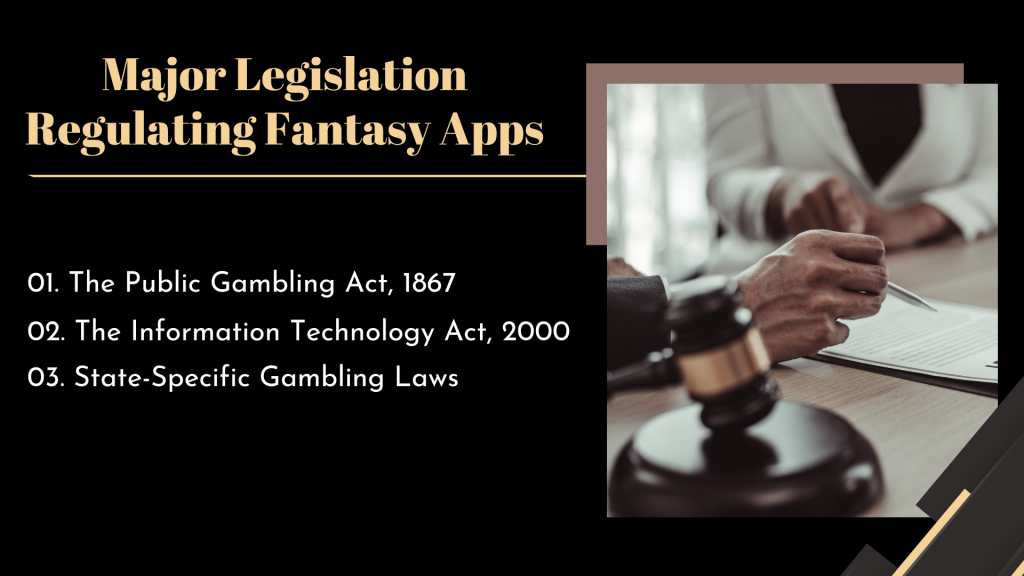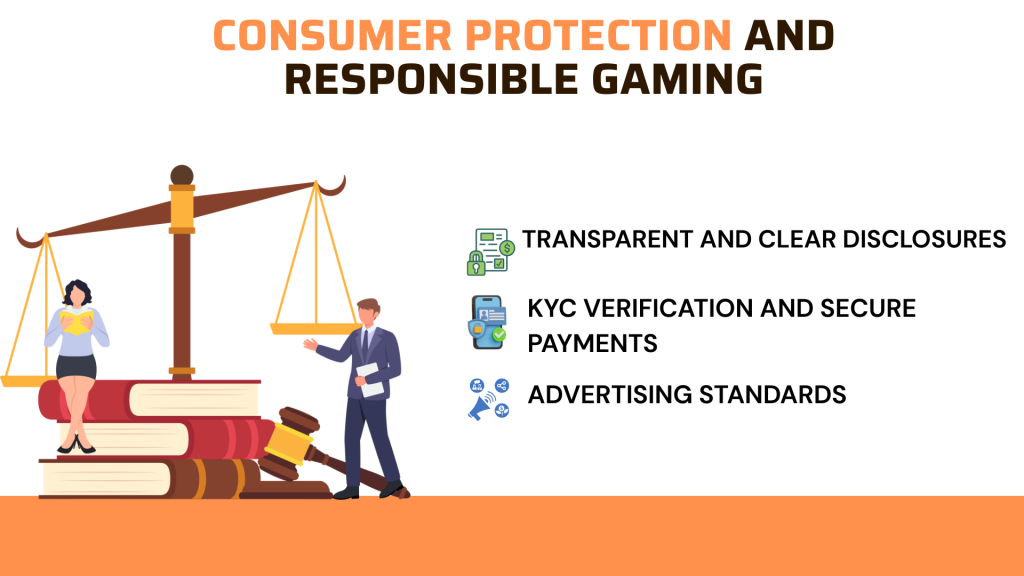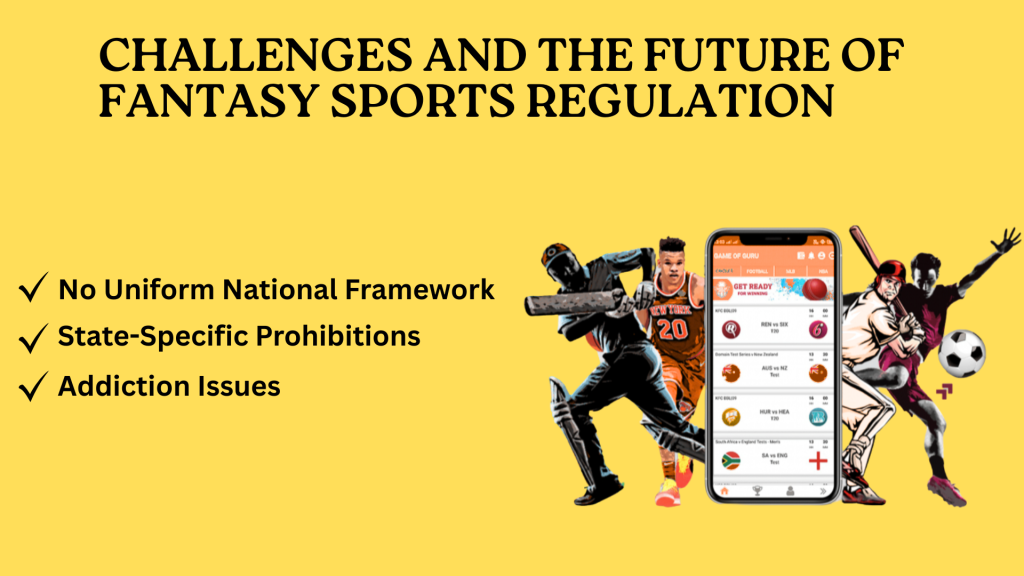
Summary: Navigating Indian law for fantasy sports presents a complex landscape. Courts legally hold such apps to be a “game of skill,” exempting them from most gambling legislation. Yet, laws are not the same everywhere. Operators have to comply with 28% GST, 30% TDS on winnings, and self-regulatory principles, so legal awareness becomes essential for users and platforms alike. |
The world of fantasy sports has enthralled India like never before. With millions of users logging in each day onto platforms such as Dream11 and MPL, what was earlier a niche pastime has grown into a multi-billion-dollar market.
As we can see, a major rise in the user base and stakes raises a critical question: What is the legal status of fantasy sports in India? This blog will guide you through the complex net of Indian law that regulates fantasy sports apps, providing an authoritative guide for both avid players and aspiring entrepreneurs in this fast-paced industry.
What is Fantasy Sports?
professional players. The teams gain points based on the actual performance of the players in real games. People compete against each other in contests, usually for prizes or money. Outcome in fantasy sports depends on strategy, sports insight, and analysis of players, hence a skill-based game. Some of the most popular sports are cricket, football, basketball, and others, particularly online.
Fantasy sports is an online game in which players make virtual teams composed of real
The Legal Overview of Fantasy Sports in India
The core of the legality of fantasy sports in India is rooted in the crucial difference between a ‘game of skill’ and a ‘game of chance’. India law on fantasy sports app, to a large extent, bans games of chance (gambling) while safeguarding games of skill as a valid profession and vocation under Article 19(1)(g) of the Constitution. The key question, therefore, was whether fantasy sports were a game of gambling or a game of skill.
According to reports from Statista, the user base of fantasy sports in India has grown incredibly, numbering around 180 million registered users during the 2023 financial year. This marks a continued positive trend that started in 2017. In the future, this figure is expected to grow enormously, with projections placing it at half a billion users within the 2027 financial year.
The Indian judiciary has time and again categorically replied to this question. The Supreme Court of India, in a succession of milestone judgments, has reaffirmed the belief that fantasy sports are games of skill.
The top court’s position is founded on the fact that a user’s victory in a fantasy sports competition does not depend on mere chance, but on the application of significant skill, knowledge, judgment, and strategy.
Considerations such as selecting a well-balanced team, understanding a player’s statistics, evaluating pitch conditions, and making decisions based on a player’s recent performance are all regarded as epitomes of skill. This judicial support is the foundation upon which the entire fantasy sports business in India operates. To learn about legal compliance in the fantasy sports business, check our guide and understand Legal Compliance in Fantasy Sports App Development in detail.
Major Legislation Regulating Fantasy Apps

While the Supreme Court has given a go-ahead, the Regulation of Fantasy Sports in India is far from a straightforward, harmonious framework. A mix of central and state legislation regulates the functioning of such platforms:
The Public Gambling Act, 1867
This pre-independence, outdated legislation is the main law that bans operating or being in command of a public house of gaming. But there is an important exemption for “mere skill” games. As fantasy sports have been judged by the courts to be skill games, they mostly fall out of this Act’s reach in the majority of states.
The Information Technology Act, 2000
Fantasy sports apps, being a virtual platform, are liable to be regulated by the provisions of the IT Act. The act oversees several aspects of the digital space, such as data security, cybersecurity, and electronic transactions. Fantasy app owners need to be extra cautious about being in line with the provisions of the IT Act regarding user data security and privacy.
State-Specific Gambling Laws
The right to enact laws on “betting and gambling” lies in the State List of the Indian Constitution. This has resulted in a patchwork legal situation where various states have their own
legislation and rules. This is an important aspect for both operators and users to know.
State-Wise Regulations for Fantasy Sports
Decentralization of Indian gambling laws implies that one can play fantasy sports for stakes, and their legality can widely differ across Indian states.
States Permitting Fantasy Sports: Most Indian states, such as Maharashtra, Karnataka, West Bengal, Uttar Pradesh, and Punjab, allow fantasy sports according to the judicial rulings that they constitute games of skill. In these states, users are able to indulge in paid contests without any restrictions.
States with Bans or Restrictions: Only a few states have been more restrictive or prohibitive. States such as Assam, Odisha, and Telangana have legislated by amending their gaming laws to cover games of skill when played for money, de facto banning paid fantasy sports contests. It is against the law for residents of these states to engage in such contests, and fantasy sports companies are mandated to block access to their websites from these states. This is a quintessential illustration of how fractured state laws become problems for the industry.
Legal Guidelines & Judgements By Courts
There have been a few major judicial precedents that have defined the legal saga for fantasy sports in India:
Varun Gumber v. Union Territory of Chandigarh (Punjab & Haryana High Court)
This was among the first and most important of these cases. The court ruled that participating in fantasy sports involved a significant amount of skill and did not constitute gambling.
Gurdeep Singh Sachar v. Union of India (Bombay High Court)
The Bombay High Court reaffirmed that fantasy sports are skill games and are a valid business activity under the protection of the Constitution.
Chandresh Sankhla v. State of Rajasthan (Rajasthan High Court)
This case further established the legal standing, with the court noting that the aspect of skill is predominant in fantasy sports.
The Dream11 Case and Supreme Court Seal of Approval
The legality of Dream11’s model has been contested several times in different courts, including the Supreme Court. In every case, the petitions have been rejected, with the top court endorsing the “game of skill” status. This has given the industry a high level of legal certainty.
Playing by the Rules: Regulatory Compliance for Fantasy App Operators
To function within the law, fantasy sports sites need to follow a strict set of rules and best practices.
Age Regulations: One absolute requirement is that players need to be aged 18 and above to join paid contests.
Geo-location Limitations: Operators have to impose stringent geo-blocking processes to prevent users from prohibited states from visiting their paid websites.
Licensing Requirements: Although there is no central licensing framework, certain states, such as Nagaland, have mandated a licensing system for online games of skill.
Federation of Indian Fantasy Sports (FIFS) Guidelines: FIFS is the self-regulatory organization for the fantasy sports sector in India. Its charter provides a code of conduct for its members to adhere to, with a focus on fair play, transparency, and responsible gaming. Meeting FIFS guidelines is the hallmark of an ethical operator.
Taxation and Financial Regulations
The growing income of the fantasy sports sector has not been lost on the taxman.
Goods and Services Tax (GST): Following much controversy, the GST Council has levied a 28% GST on the entire face value of the entry fee for all online real-money games, including fantasy sports.
Tax Deducted at Source (TDS): All fantasy sports winnings above ₹10,000 in a financial year attract a TDS of 30%. This is deducted by the fantasy sports operator before crediting the winnings into the account of the user.
Foreign Direct Investment (FDI): The Government of India allows 100% FDI in the online gaming industry for games of skill, which has made way for a major foreign investment in Indian fantasy sports platforms.
Consumer Protection and Responsible Gaming

As the user base grows at a fast rate, consumer protection and responsible gaming are increasingly important concerns.
Forced Disclosures: The platforms must make transparent and clear disclosures regarding the risks involved in playing for stakes. This can be achieved by making prominent disclaimers and establishing expenditure limits.
KYC Verification and Secure Payments: Strong Know Your Customer (KYC) verification is required for every user who wants to withdraw their winnings. Secure and trusted payment gateways are also a requirement.
Advertising Standards: The Advertising Standards Council of India (ASCI) has established certain guidelines for the promotion of online real-money games. These include financial risk and addictive nature disclaimers, and a ban on marketing to minors.
Challenges and the Future of Fantasy Sports Regulation

Even with the legal clarification through the judiciary, the online fantasy sports sector in India is confronted with many challenges:
No Uniform National Framework: The lack of a unified, all-encompassing law for online games results in regulatory uncertainty and compliance challenges for operators.
State-Specific Prohibitions: States’ authority to prohibit even games of skill provides a fractured market and stifles the sector’s potential for growth.
Addiction Issues: The risk of addiction is an actual issue that has to be dealt with through strong, responsible gaming provisions and awareness campaigns amongst users.
In the future, the regulation of fantasy sports in India is expected to be headed in the direction of a more centralized and comprehensive regime. The suggestions of a NITI Aayog draft report, which proposed a self-regulatory organization with government supervision, could lead to the creation of a more stable and predictable regulatory landscape.
Looking ahead, the future of the regulation of fantasy sports in India will probably witness a shift towards a more comprehensive and centralized framework. A draft report by NITI Aayog, which suggested a self-regulatory organization subject to government oversight, could set the stage for a more stable and predictable regulatory regime.
Building Legally Compliant Fantasy Sports Platforms in India
The Fantasy app developer ensures the app meets laws that differentiate games of skill from gambling. The site should adhere to the Public Gambling Act, 1867, and not operate in states like Assam, Telangana, and Odisha, where the games are prohibited. Although there is no central licensing authority, firms tend to comply with FIFS or AIGF.
The developer needs to have secure payment mechanisms, age verification, and protection of user data, maintain legal compliance, and a skill-based, safe gaming environment.
Conclusion
Indian legal scenario for fantasy sports is a compelling mix of constitutional rights, colonial legislation, judicial acumen, and changing regulations. Although the “game of skill” status makes for a robust legal framework, the path to operators and consumers is one of careful understanding of a labyrinth of state laws, tax liabilities, and compliance obligations.
For sustainable growth, the sector will have to continue to focus on transparency, user protection, and socially responsible gaming. For users, being aware of the legal technicalities and opting for platforms that follow the best practices in compliance is of paramount importance. While the fantasy sports sector in India keeps growing phenomenally, a clear and consistent law will be the final umpire, guaranteeing an even and thrilling game for everyone.
Frequently Asked Questions
Yes, fantasy sports are legal in India in general if they are treated as a game of skill and not a game of chance. The Supreme Court and various High Courts have ruled that skill-based fantasy gaming sites like Dream11 are legal.
Fantasy sports apps are regulated by a combination of the following laws:
- The Public Gambling Act, 1867
- State gambling laws
- Information Technology Act, 2000
- Consumer Protection (E-commerce) Rules, 2020
In Tamil Nadu, Assam, and Telangana, fantasy sports could be prohibited or restricted; hence, one needs to verify local laws.
There is no central licensing for fantasy sports apps at present. Nevertheless, firms usually self-regulate under the umbrella of industry associations such as the All India Gaming Federation (AIGF) or Federation of Indian Fantasy Sports (FIFS) to comply with law and maintain ethical operations.
Yes, fantasy sports involving real money are legally allowed for users as long as the site is a game of skill. The app, however, must put its terms and conditions clearly, promote fair play, and work within the legal jurisdictions.
Developers face legal risks such as:
- Operating in states where such apps are banned
- Misclassifying games of chance as games of skill
- Violating data protection, advertising, or payment laws
To reduce risks, it’s important to consult legal experts and implement robust compliance mechanisms.





